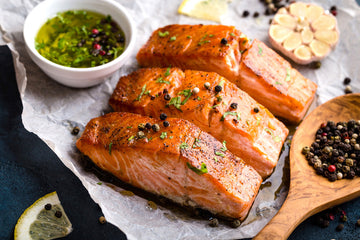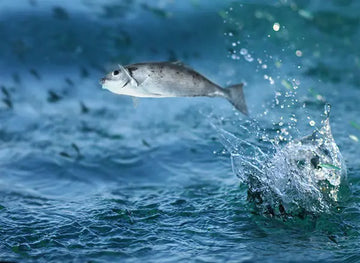Fish is a nutritious and health-promoting choice. It is high in protein, a good source of heart-healthy omega-3 fatty acids, rich in vitamin D and minerals (including iron, iodine, magnesium, and potassium), and low in saturated fat. Eating fish at least twice a week is associated with lower risk of several chronic conditions, including stroke, depression, Alzheimer’s disease and heart diseases. The confusion about what kind of fish to consume farm raised or wild caught is a big Question of concern. Here is some factors based on which the farm raised and wild caught fishes can be differentiated are listed follows:
1. Contamination:
Levels of contaminants in fish are dependent on many factors and vary widely. Fish will be exposed to any pollutants that have made their way into the water, including pesticides, mercury, and other metals. In the wild, larger and longer-living fish tend to have the highest levels because they accumulate contaminants from the smaller fish they eat. In the land-based or enclosed tanks, the environment is controlled to minimize contaminants.
What does VTF do: VTF procures fishes from those farmers whose farms are located away from industrial area which in turn prevent any form of contaminants entry to the water source and fishes are free from contaminants.
2. Antibiotics: Wild-caught fish could have trace amounts of antibiotics in their systems if the drugs have gotten into the natural environment. Stress on farmed fishes can increase disease susceptibility, sometimes requiring use of antibiotics.
What does VTF do: Since there is a chance that farmer uses antibiotics at the farming stages, VTF follow a process of testing and validation of fishes prior to purchase from certified laboratory which can prevent the entry of antibiotics presence to the end user.


Fig: Above- Farm raised feeding on high protein pellet feed by certified companies.
Below- Wild caught fishes by fishermen at sea.
3. Sustainability: Avoiding overfishing in the wild is essential: there must be enough fish left in the water to make sure the resource can renew itself in the future. It is also important to protect the environment and other wildlife from damage; net breakage and unintended catches threaten multiple species of wildlife. Farming fish helps prevent overfishing in the wild. New strategies and technologies have been developed by farming in controlled environment. When done responsibly, farmed fish is environmentally responsible.
What does VTF do: VTF procures fishes from farms which are bio secured and farming in a controlled environment with technology improved methods in fish farming.
4. Cost: Nature’s inconsistencies like weather and food availability, as well as fishing seasons, can limit fish supply and cause prices to fluctuate. Farmed fish typically cost less and sell at a more consistent price than wild-caught fish due to a controlled, predictable environment and harvest.
What does VTF do: VTF provide lean protein in a sterile environment that are economical and safe for consumption since we follow FSSAI standard in each and every step in the product handling.
5. Handling: Wild caught fishes not be washed and properly iced which can lead to the contamination of fishes. The quality of water and iced used in handling of fishes are unknown unlike in farmed fishes the water quality can be monitored and established.
What does VTF do: VTF follow a process of post-harvest process and cold chain logistics in which fishes are harvested and in chilled and fresh condition. The fishes once out of water are chill killed and packed in 3-layer icing for enhanced flavor, texture and free from fishy odor.
Prepared by - Abin.S.N. (MSc. Industrial fisheries & Fish Biologist)





